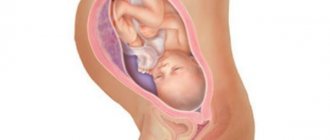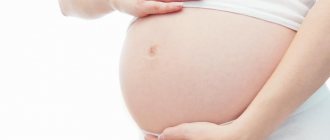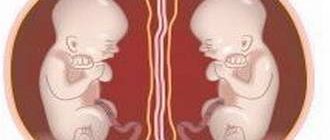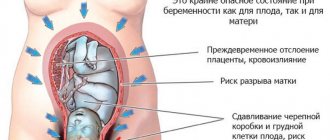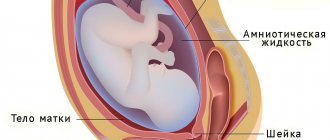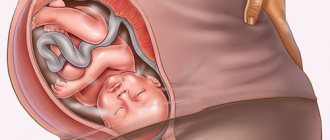The 34th week of pregnancy brings the long-awaited moment of meeting your baby in the real world closer. By this time, the baby has grown a little more, and this complicates the woman’s movements. But, nevertheless, we should not forget that during this period it is very important to lead an active lifestyle and take daily walks in the fresh air. If after a little physical activity your lower abdomen feels tight or your stomach becomes stiff, you should definitely rest.
The period of 34-35 weeks of pregnancy requires a very careful attitude towards yourself. You should lie down, get up and sit down smoothly and very carefully. Due to the shift in the center of gravity of the body, due to the fact that the baby’s weight at 34 weeks is quite large, there is a risk of loss of balance and falling. Be sure to continue caring for your skin this week to avoid the appearance of stretch marks.
Feelings in the abdomen at 28 weeks
In the third trimester, the baby is especially active. The main sensations in the stomach that mark the 28th week of pregnancy are the movements of the baby. Over time, such changes will be more noticeable.
The third trimester is often accompanied by painful sensations. Very often, girls have tightness in the lower abdomen at 28 weeks of pregnancy. This is due to tension in the muscles and ligaments that support the uterus. If pain occurs from time to time, when changing body position, there is no reason to worry.
If your lower abdomen hurts at 28 weeks of pregnancy, you need to be under constant medical supervision. He will be able to determine the nature of your feelings and take the necessary measures.
Reasons for concern
Some things shouldn't be ignored. Contact your doctor immediately if you notice:
Sudden swelling of the legs, face or arms. If it is gradual and gets worse throughout the day, it is most likely normal swelling. However, if the body swells suddenly, it may be a sign of preeclampsia. Go to the doctor immediately. Slow fetal movements. If the child moves less than usual, count the number of strokes. If after 2 hours the movements do not become normal, consult a doctor so that he can examine you and make a conclusion about the child’s condition.
Decreased fetal movements
As your child grows, you may notice that he or she becomes less active. In fact, if he is healthy, he will move as vigorously as when he was little, but the sensations will be different because he is now curled up and squeezed into your uterus. It doesn't have as much room to move as, say, you do when you're taking a bath. If you're worried because you've noticed a big difference in your baby's activity level, you can count the number of strokes. After eating, sit or lie down in a quiet place, where no one can distract you, time it and count how many times the child moves, pushes, kicks, rolls over, or hits you in the ribs with his elbow. (Don't worry about how many times he hiccupped.) You can count how many times he moves in an hour or how long it takes him to move 10 times. If you don't feel him move, try again later - he might be sleeping. Most likely, the baby will kick 10 times in an hour, although it may happen that you count 10 kicks much more than in an hour. Record how often your baby pushes
Discharge at the beginning of the third trimester
At week 28, the appearance and consistency of the discharge should be the same as during the entire pregnancy. Any changes indicate a malfunction in the baby’s development or the functioning of the mother’s reproductive system. The reasons for going to the doctor should be:
- the appearance of a cheesy mass,
- Discharge color changes to gray or green,
- purulent discharge,
- mucous formations,
- watery discharge.
Bleeding at 28 weeks of pregnancy is especially dangerous. This condition poses a certain threat to the baby’s health and your condition. Under no circumstances should you put off going to the doctor. A common condition for pregnant women - thrush - at 28 weeks of pregnancy can also be dangerous. With regular symptoms and lack of treatment, candidiasis can affect the health of the child and mother. Your obstetrician-gynecologist will tell you in detail about what kind of discharge may be present at 28 weeks of pregnancy. This way you will know exactly about the normal state of discharge in the third trimester.
What to take with you when you leave home
Whether you're going for a walk with your baby or decide to go to the local supermarket, if you take everything you need with you, it will be easier for you and your baby to spend time outside the home. Before you buy anything; talk to friends and family members. You can borrow something, thereby saving. If you decide to buy something, you should not follow the advice of others. They can share with you their most successful experiences, or they can share with you their most serious mistakes. Here's something to keep in mind.
Diaper bag. Which bag you choose depends on how much you need to carry. Some women like everything bags that have room for bottles, toys, a change of clothes, and a blanket for the baby. Others prefer smaller bags that can fit a couple of diapers and a pack of wipes. All bags look different. You can buy a leather one made by a fashion designer for several thousand or a cheap plastic one. In addition to size, think about how you prefer to carry your diaper bag—on your shoulder, on your back like a backpack, with handles, or something in between. Color also matters: if your partner will be carrying this bag, it is better to buy something in a neutral color than a woman's bag with flowers. Some women say that it is better to have two bags.
Stroller. There are so many different types of strollers, it can be dizzying to see them all: car strollers, drop-top strollers, crib-style strollers, jogging strollers, straight strollers, double strollers, and ones where your baby sits in the front and his sibling sits in the back. Which one you can buy depends on personal preference; different options are needed for different purposes. It is important to test the stroller before you buy it. To do this, see if the handle is comfortable for you to hold, if the wheels move normally, if you can lift it in and out of the car trunk, if it folds easily (if you want it to fold), if the seat is suitable for sleeping and how much space there is in it. Prices for strollers may vary, but a high price does not always mean good quality, so you should not choose based on the fact that the stroller is from a well-known manufacturer.
Stroller. The type of stroller you need depends on what you are going to do. Will you be walking in a yard with cement paths or running on paths? Do you want a stroller that folds easily and can be stored in the trunk? Maybe a stroller that turns into a bike trailer would be suitable? Among other things, you should think about the size of the wheels (the larger the wheels, the softer the stroller rides on paths), the suspension (the better it is, the softer the stroller rides), the type of front wheels (a wheel fixed in place is suitable for those who run , loose - for those who shop and walk) and price. Additionally, you might want to consider a removable seat, cup holder, and cover on top. There are strollers for one, two and three children.
Kanguryatnik. Choose a backpack that suits your lifestyle. Climbing mountains requires a stronger backpack than going shopping. Not all backpacks are universal and will suit every woman, so inspect the backpack in the store, perhaps putting your child in it, to find out that he will fit in it normally. You'll also want to think about cushioning, padding and shoulder straps (to keep them from hurting), how easy it is to put on and take off (especially if you won't have anyone helping you lift the backpack onto your shoulders), and how much space there is in the backpack. A foldable backpack that can be worn either front or back. These backpacks can be worn both front and back. Many parents complain that it is very difficult to change positions; try them in the store before you buy.
Folding stroller/backpack. This option may be suitable for tourists, people who often travel around the city, and those who need something between a backpack and a stroller. Look for a model that is easy to transform and doesn't require you to pull your baby out or ask someone to help you. Before purchasing, inspect the stroller in the store. to make sure that this model is not too heavy and uncomfortable so that it makes a good backpack, and that the wheels are strong enough so that it makes a good stroller.
Sling. Slings help you carry your baby in front, near your hip or on your back, with your baby's face or back facing you. They help to quickly feed the baby, but fathers can also use them, just like mothers. Slings are sold with or without padding.
Seat for a child. This seat is needed to keep the child close and your hands free. A good seat is comfortable, holds your baby tightly, doesn't cut or pull on your shoulders, and can be adjusted for both you and your partner; It can be unfolded to support the neck of a small child, and give an older child the opportunity to turn his back to you and look at the world.
Cold in the 7th month of pregnancy
In the last months of pregnancy, expectant mothers should be very attentive to their health and well-being. If you do get a cold at 28 weeks of pregnancy, you need to see a doctor. The danger of the condition lies in possible complications. ARVI at the 28th week of pregnancy can provoke low and polyhydramnios, disturbances in the development of the fetus in the womb, and placental changes. In special cases, there is a possibility of infection of the baby.
If you get sick during pregnancy, do not self-medicate under any circumstances. Many medical antiviral drugs are contraindicated for expectant mothers.
User comments
no more vomiting!)
I felt sick again yesterday.
but I think I understand what's what.
It's the smell of MEAT. when I cook... I fry, I steam it for my beloved!
These are the pies.
Your baby is 34 weeks pregnant.
Much of the weight your baby gains is now stored in fatty tissue, which will help protect him from the cold world after birth. Now the baby weighs about 2 kg, and he has almost no room to turn around. This doesn't mean he will stop moving, but you may notice changes in movement. Now the baby closes his eyes when he sleeps and opens them when he is awake. In addition, he learned to blink. At this stage of pregnancy, the baby's brain is so well developed that he can see, hear, learn and remember. He has become a full-fledged person, and soon you will be able to meet him face to face.
Headaches in the third trimester
Many girls complain that from the 28th week of pregnancy they have a headache from time to time. Unfortunately, this condition can occur quite often, causing discomfort. In most cases, in the absence of other symptoms, headaches do not pose any danger to the expectant mother and baby.
Dizziness during pregnancy at 28 weeks may also be a common occurrence. Increasing in size, the fetus begins to put pressure on the diaphragm. It becomes harder for a pregnant girl to breathe. The circulatory system lacks oxygen. If you often feel dizzy at 28 weeks of pregnancy, try to breathe more fresh air and be in nature.
Making a list of people to call
Your grandma, friends and neighbors will be on tenterhooks waiting for news of your baby's arrival, but after giving birth you and your partner won't want to call 100 friends and family to tell them everything. Now is the time to create a “call tree.” First, make a list of people you need to contact. Then make a “call tree”. For example, you call your parents and husband's parents. They call all your brothers and sisters. One of the brothers calls your best friend, neighbor and girlfriend from work. The best friend calls all the other friends, the neighbor tells the other neighbors about everything, the friend from work tells the good news to other colleagues, and so on. A phone tree only helps if everyone has a list of names and phone numbers they need in advance. Double check phone numbers in the weeks before your due date so friends and family don't have to hunt down the numbers. You can notify someone by email. If you want to do this, find out the email addresses of everyone you need in advance, prepare a group list and check it.
Also, set up a phone tree for those who don't use email or only have work email where they can't send anything personal if these people would like to wait until Monday to find out. Some hospital websites will include photographs of children for friends and family to look at. Others have wards for new mothers where you can do this yourself. Find out if your hospital offers this service and if you need to make any arrangements in advance.
Soda for heartburn during pregnancy: is it possible?
Baking soda has been the most popular home remedy for heartburn for many years. However, pregnant women should not abuse this method.
Experts say that after drinking a soda solution, heartburn is likely to return after 30 minutes to an hour. Sodium in the composition increases swelling of the extremities and affects the functioning of the cardiovascular system.
You can take soda as a last resort when it is not possible to find a safer medicine.
For pregnant women 1 tsp. soda is quenched with half a teaspoon of vinegar and stirred in 125 ml of water.
Signs that require treatment
At any week of pregnancy, heartburn may bother you. It manifests itself independently or in combination with abdominal pain and nausea. The growing uterus puts pressure on the gastrointestinal tract, promoting the release of stomach contents into the esophagus.
To relieve the symptoms in question, it is recommended to eat small meals. In the morning it is useful to eat oatmeal, which is characterized by a binding effect and coating of the stomach.
To prevent heartburn with nausea, you should not lie down after eating, it is better to walk around. For severe heartburn, you can drink a weak soda solution, an enveloping medication.
At week 34, swelling is very bothersome. In this case, no nausea is observed. Swelling appears on all extremities. To monitor the condition, it is recommended to monitor the amount of fluid consumed.
The volume of fluid released must exceed the volume of fluid consumed.
It is useful to drink decoctions that have a positive effect on the diuretic system. But before taking them, you should consult your doctor.
With the help of cranberry juice, a disinfectant effect is exerted on the body, which ensures the death of bacteria.
Gynecologists advise to constantly measure blood pressure in a home, normal environment at a later date. If the value of the indicator is deviated from the norm, the help of a therapist is required.
If you experience constant pain, dizziness, drowsiness, or the appearance of floaters, you must urgently measure your blood pressure in consultation with your physician. At the same time, you should avoid lying horizontally.
This is due to the fact that blood, compressed by the uterus, does not flow through the vein to the right side of the heart, which reduces the pressure. Therefore, doctors advise pregnant women to lie on their left side.
If there is heaviness in the abdomen and lower back, nausea, and the patient often suffered from uterine diseases before pregnancy, the gynecologist may prescribe Magne-B6 therapy.
Pain in the uterus cannot be tolerated or eliminated on your own. In such cases, urgent obstetric and gynecological care is required.
At 34 weeks, cardiac monitoring of the fetus is prescribed. It is carried out over 10 days. If necessary, manipulation is performed more often.
This study records the child's heartbeat and motor activity. Based on the data obtained, the doctor concludes what condition the child is in.
Mom's diet and weight
By the 34th week of pregnancy, a woman’s weight can increase by 10-12 kg, depending on her body type, the increase ranges from 8 to 15 kg. Thin women are allowed to add more. It is important to monitor the weekly gain - it should not exceed 300-500 grams; with increased gains, the development of gestosis in pregnant women, kidney pathologies and edema as a result of poor nutrition and fluid retention is excluded.
It is important now to eat properly and nutritiously, in small portions, but often, at least five to six times a day. In the diet, you need to increase the amount of protein and fresh vegetables and fruits, fiber, with a decrease in the amount of salt, fatty and carbohydrate foods. With increased weight gain, the doctor may recommend fasting days - kefir, rice, apple.
Ultrasound examination (Uzi)
During this period, routine ultrasounds are usually not prescribed, but for special indications, additional research may be indicated. If you have not previously undergone an ultrasound, you will need to evaluate all the main ultrasound indicators - clarify the gestational age, estimated weight and height of the fetus, look at the sex of the child, and also assess the degree of its development - are there any defects and abnormalities during pregnancy, are there any intrauterine Pod growth retardation.
The interpretation of the ultrasound is carried out by a doctor - according to the study, the presentation and position of the fetus, the condition of the walls and cervix, the umbilical cord, the amount of amniotic fluid and location, the thickness of the placenta and the degree of its maturity are looked at. If necessary, an additional study will be prescribed - Doppler measurements of the fetal blood flow, which will show how actively the fetus receives nutrition and oxygen. During this period, it is possible to conduct a 3D ultrasound, but due to the large size of the fetus, it is impossible to see it entirely on the monitor screen, you can only view individual parts.
Preventive measures
Doctors suggest that pregnant women at 34 weeks adhere to the following recommendations that will help prevent nausea and other symptoms:
- rational drinking and eating;
- walks in the open air;
- avoid various worries.
At 34 weeks the pregnancy ends. During this period, the fetal organs and their functions are improved. At the same time, the female body prepares for childbirth.
If the condition of the child and the woman in labor deviates from the norm, it is recommended to consult a gynecologist. If pathological processes are identified, outpatient or inpatient therapy is carried out for the pregnant woman.
